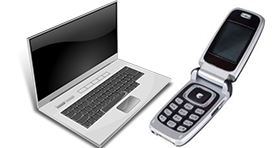Dec 12, 2014
By Rebecca Turygan, Environmental Research Assistant
One of the most frequent questions we get from residents is, “How do I dispose of my old electronics?”
In a society of constant technological advance, most of us have outdated electronics (e-waste) collecting dust in our homes. Getting rid of these items may not be as simple as your other household waste, but it’s very important.

Why Can’t I Throw My Electronics in the Trash?
Electronics contain a number of toxins, including lead, mercury, cadmium, nickel and zinc. Improperly handling discarded electronics can expose hazardous chemical compounds known to negatively affect human and environmental health. This is why ACUA and other landfills cannot accept any electronics for disposal.
So What Do I Do?
In 2011, New Jersey enacted the “ Electronic Waste Management Act” to help ease the burden of electronics disposal from consumers. The law pushes for extended producer responsibility (EPR), meaning that those who manufacture potentially hazardous products need to be held responsible for their disposal. Now, companies that make televisions, such as Sony, must contribute financially towards disposal programs.
The concept of extended producer responsibility is not new in New Jersey. Home Depot and Lowes have been accepting old compact fluorescent lights (CFLs) for years. Consumers are able to bring CFLs to the store free of charge, and the company will send it to be recycled. This strategy has proven to be much trickier to implement for electronics, though. Large electronics, such as computers and televisions, need to be in good condition in order to be recycled. If a screen is smashed or other damage is done, it loses its recycling value and becomes very expensive to ensure proper disposal.
Consumers can help the process along by properly handling outdated electronics. Make it a priority to keep electronics intact until items are collected or dropped off at an e-waste recycling facility. Electronics should not be left out at the curb -- unless it is the night before an authorized e-waste curbside collection by a municipality -- to avoid scrappers from breaking them in search of valuable cooper and other materials.
By working together, the Electronic Waste Management Act can ensure a functional and convenient system for electronic waste.
Local Options
Many municipalities across the county have established e-waste recycling programs for residents. Contact your Public Works department to see if one is established in your town.
Best Buy, Goodwill, Staples, and most cell phone companies offer recycling options to consumers. Click here for locations in Atlantic County.
And remember, electronics cannot be tossed into your trash or recycling bin at home!
Additional Resources
- The Story of Electronics
- EPR's Next Step